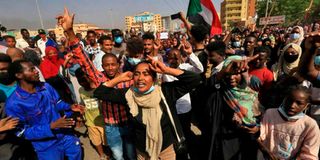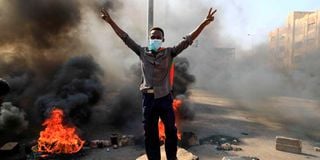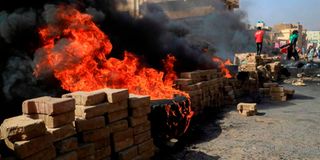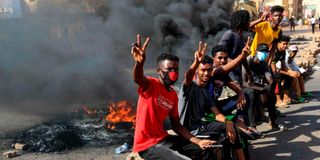Sudan PM Abdallah Hamdok put under house arrest - Media reports

Sudan's Prime Minister Abdalla Hamdok.
Sudan’s Prime Minister Abdallah Hamdok was put under house arrest on Monday after an unidentified military force occupied his house.
This is according to Al Hadath TV, a local news network, which cited unidentified sources.
The house arrest comes shortly after Sudan’s military arrested Hamdok's media advisor.
Unidentified military personnel also arrested four cabinet ministers and a civilian member of the ruling sovereign council, local reports said.
AFP reports that demonstrators have blocked roads in Khartoum, Sudan's capital city, to protest the arrests.

Sudanese protesters march in 60th Street in the capital Khartoum, to denounce overnight detentions by the army of members of Sudan's government, on October 25, 2021.

Sudanese protesters burn tyres to block a road in 60th Street in the capital Khartoum, to denounce overnight detentions by the army of members of Sudan's government, on October 25, 2021.
There is also an internet cut in Sudan.

Sudanese protesters use bricks and burning tyres to block 60th Street in the capital Khartoum, to denounce overnight detentions by the army of members of Sudan's government, on October 25, 2021.
'Creeping coup'
The arrests and Hamdok's home detention come a month after a failed coup attempt. At the time, a top government source said the plotters had attempted to take over the state media building in September but "they failed".
The news also comes just two days after a Sudan faction calling for a transfer of power to civilian rule warned of a "creeping coup", during a press conference that an unidentified mob attack had sought to prevent.
Sudan has been undergoing a precarious transition marred by political divisions and power struggles since the April 2019 ouster of president Omar al-Bashir.
Since August 2019, the country has been led by a civilian-military administration tasked with overseeing the transition to full civilian rule.
The main civilian bloc -- the Forces for Freedom and Change (FFC) -- which led the anti-Bashir protests in 2019, has splintered into two opposing factions.
"The crisis at hand is engineered -- and is in the shape of a creeping coup," mainstream FFC leader Yasser Arman told the Saturday press conference in the capital Khartoum.
"We renew our confidence in the government, Prime Minister Abdalla Hamdok, and reforming transitional institutions -- but without dictations or imposition," Arman added.
Tensions between the two sides have long simmered, but divisions ratcheted up after a failed coup on September 21 this year.

Sudanese protesters flash the V for victory sign as they burn tyres to block a road in 60th Street in the capital Khartoum, to denounce overnight detentions by the army of members of Sudan's government, on October 25, 2021.
Last week tens of thousands of Sudanese marched in several cities to back the full transfer of power to civilians, and to counter a rival days-long sit-in outside the presidential palace in the capital Khartoum demanding a return to "military rule".
Hamdok has previously described the splits in the transitional government as the "worst and most dangerous crisis" facing the transition.
On Saturday, Hamdok denied rumours he had agreed to a cabinet reshuffle, calling them "not accurate".
The premier also "emphasised that he does not monopolise the right to decide the fate of transitional institutions."
Also on Saturday, US Special Envoy for the Horn of Africa Jeffrey Feltman met jointly with Hamdok, the chairman of Sudan's ruling body General Abdel Fattah al-Burhan, and paramilitary commander Mohamed Hamdan Daglo.
"Feltman emphasised US support for a civilian democratic transition in accordance with the expressed wishes of Sudan's people," the US embassy in Khartoum said.
Analysts have said the recent mass protests showed strong support for a civilian-led democracy, but warned street demonstrations may have little impact on the powerful factions pushing a return to military rule.





